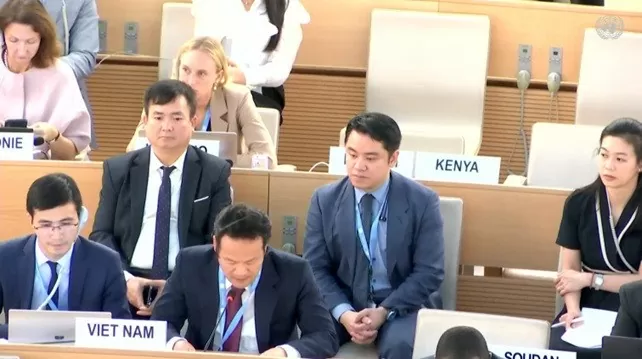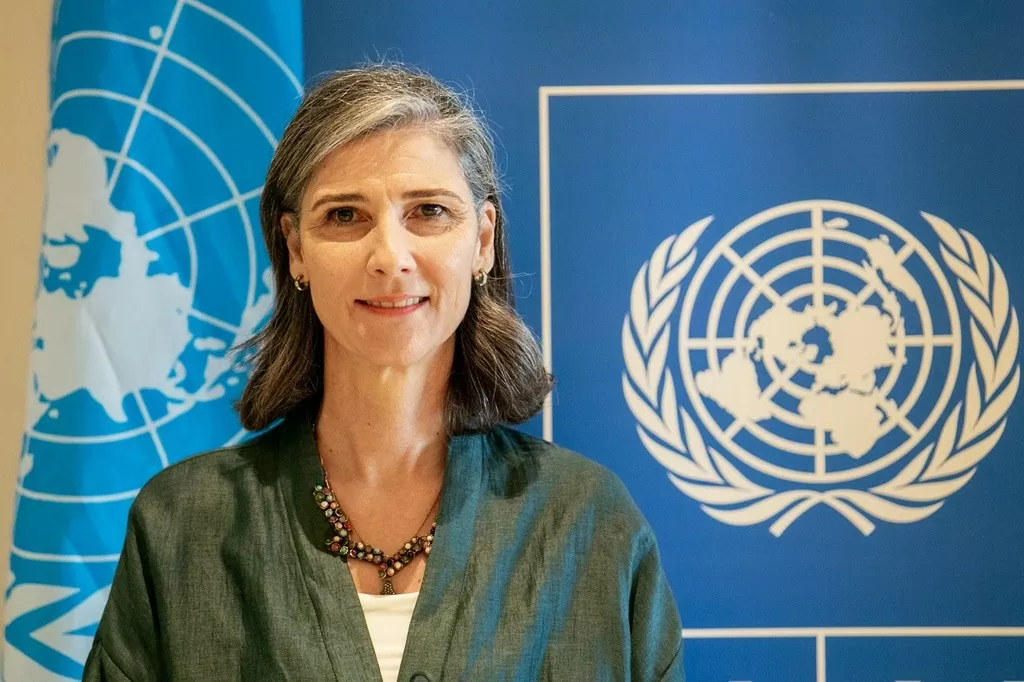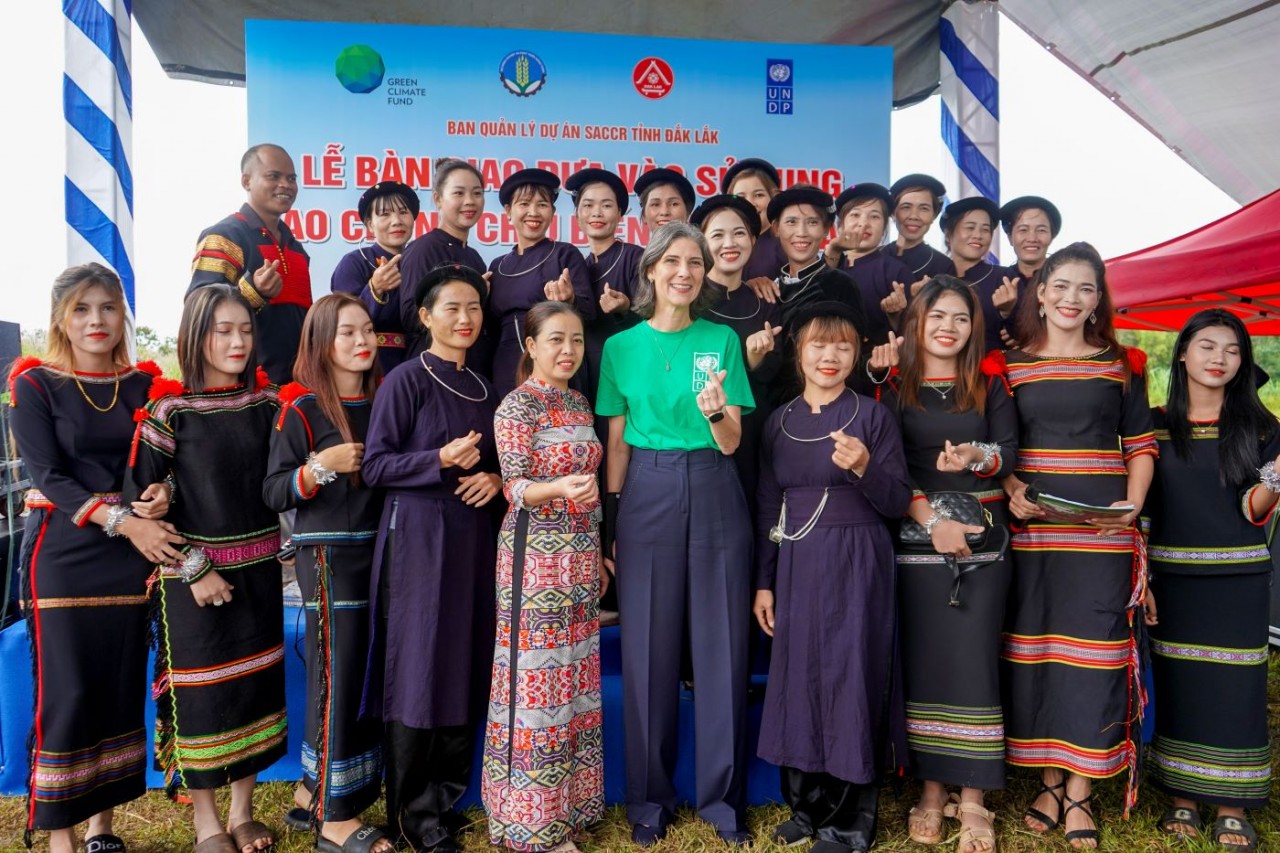
UN Resolution highlights human rights in the climate fight - A call to action for Viet Nam, Southeast Asia and the World: UNDP Resident Representative
Latest
 |
| The Vietnamese delegation at the Human Rights Council (UNHRC). UNHRC passed the Resolution on human rights and climate change, July 10. (Photo: PĐ) |
On the 10th of July 2024, the United Nations Human Rights Council (UNHRC) adopted its 14th annual resolution on human rights and climate change.
Co-sponsored by Bangladesh, the Philippines, and Viet Nam, Resolution A/HRC/RES/56/8 underscores the growing concern among Member States about climate change’s mounting impact on fundamental rights and freedoms.
 |
| UNDP Resident Representative in Viet Nam Ramla Khalidi. (Photo: VL) |
Putting particular emphasis on the centrality of human rights
It is no coincidence that these three Asian countries took the lead in promoting the resolution.
Being among the world’s most climate-vulnerable, Bangladesh, the Philippines, and Viet Nam have leveraged their position to highlight the severe consequences of climate change, especially on densely populated coastal regions, including frequent and severe flooding, rising sea levels, saltwater intrusion, displacement, forced migration and loss of life and livelihoods.
The resolution calls on UN Member States “to consider human rights within the framework of the United Nations Convention on Climate Change and the Paris Agreement”.
This year, the resolution’s co-penholders put particular emphasis on the centrality of human rights to achieve just transitions. This focus is particularly relevant for Viet Nam, which, in December 2022, together with the International Partners Group (IPG) announced a Political Declaration on establishing an ambitious Just Energy Transition Partnership (JETP), with an initial fund of USD15.5 billion to be mobilized for Viet Nam.
The resolution highlights the importance of just transitions for sustainable development, poverty eradication, quality job creation, and climate change mitigation. There is widespread recognition that green transitions do not automatically guarantee inclusive and equitable outcomes. A harmonized approach to responding to climate change and ensuring human rights, with meaningful participation in the design, implementation and monitoring of climate policies and programmes, are vital to ensure equitable benefits.
So too are efforts to promote proactive learning and education for future employment or upskilling opportunities. This involves creating decent work, enhancing social security, reducing inequalities and poverty, especially for those most impacted by climate change.
To achieve these outcomes, the resolution calls for a country-driven, people-centered, gender-responsive, and age- and disability-inclusive approach to climate action that recognizes the safe and meaningful participation of civil society, conducted in a regular, systematic, and transparent manner.
The resolution also emphasizes Loss and Damage, particularly in vulnerable countries, and calls for developing ambitious post-2025 climate finance targets to support developing countries, protecting the most vulnerable communities.
The recent announcement that the Government of the Philippines will host the meetings of the Board of the Loss and Damage Fund with the World Bank is a welcome signal and recognition that global finance should be designed to support the most vulnerable and those impacted by climate change.
The Fund must ensure compensation schemes are in place to build back better using human rights principles. This approach should go beyond humanitarian aid to include preparedness and prevention of catastrophic life and socio-economic losses.
 |
| Ms. Ramla Khalidi - UNDP Resident Representative in Vietnam at the handover ceremony of climate change resistant ponds to cope with the upcoming dry season in Dak Lak. (Source: UNDP Vietnam) |
The time to turn the commitments into actions is now
With the climate crisis intensifying, especially in low-lying regions of Viet Nam, the time to turn the commitments of Resolution A/HRC/RES/56/8 into tangible actions on the ground is now. The United Nations Development Programme (UNDP) is committed to working with the Government and people of Viet Nam in responding to these challenges through human rights-based climate policies and actions.
This includes supporting a just transition based on sound evidence of the socio-economic risks and opportunities of a transition, especially for vulnerable populations, and on meaningful public participation and engagement, especially of communities most affected by climate change. It also includes UNDP’s direct work with local governments, communities, farmers, women, ethnic minorities, youth, migrants, and persons with disabilities, who are leading climate action at the local level.
Their efforts, individually and collectively, are central to a human rights-based approach to climate change mitigation and adaptation that places people at the center.
Finally, UNDP also seeks to support the implementation of Viet Nam’s 2023 National Action Plan on Responsible Business, which upholds corporate responsibility to avoid adverse human rights impacts through environmentally sustainable practices.
As Viet Nam, together with the Philippines and Bangladesh, reminds the international community of the urgent need to address the human rights-climate change nexus at the global level, let us join forces - Government, communities, socio-political organizations, academia, private sector, and international partners - to further turn those commitments into lived realities for current and future generations of Vietnamese.
| Efforts on the Human rights - Climate change nexus Tackling Loss & Damage Globally, it is estimated that the economic costs of Loss and Damage (L&D) for developing countries would range from $290–580 billion USD annually by 2030 . In Viet Nam, climate change has caused significant economic and non-economic losses, threatening its economic growth. Without effective adaptation solutions, a 1oC increase in temperature could cause a 1.8% GDP loss, and a 1.5oC increase could result in a 4.5% GDP loss, (AFD, 2021). Without intervention, damage may reach as much as USD 4.3 billion over the next 10 years (World Bank, 2020). UNDP supports Viet Nam in designing a proactive legal framework to address human rights and L&D issues as part of Environmental protection, Disaster Risk Reduction, and social protection under the UNFCCC framework. Measures include strengthening early warning systems and disaster risk reductions policies, mobilizing resources, and operating the Disaster Prevention Fund to support vulnerable communities during disasters. Since 2020, Viet Nam has incorporated a broader concept of L&D in its National Adaptation Plan and NDC. However, gaps remain in establishing a comprehensive action plan for L&D management and finance. UNDP also provides technical assistance to address these gaps, working closely with MONRE to develop a comprehensive action plan for the upcoming 2025 NDC. Establishing a Just framework in JETP implementation The Just Energy Transition Partnership (JETP) agreed with the IPG, includes securing $15.5 billion while peaking power sector emissions at 170 MtCO2 by 2030 and achieving 45% renewable energy generation by then. UNDP has supported the Government since the adoption of the Political Declaration on JETP in 2022, focusing on formulating the Resource Mobilization Plan (RMP) through technical assistance and capacity building. UNDP advocates for just transition mechanisms within JETP, consolidating efforts from the Government, IPG, and UN to enhance understanding and facilitate an inclusive, affordable and sustainable transition pathway. This includes designing a just framework to screen potential impacts of JETP investment measures and recommend response actions in pilot projects. The framework aims to create decent work and quality jobs, develop skills, and invest in strategic policies that uncover new opportunities for affected communities. It also calls for people-centered interventions and social dialogue that considers the needs of the most vulnerable. Programmatic Efforts UNDP promotes human rights in the context of climate change through climate resilience programmes, and targeted climate finance. Initiatives focus on protecting vulnerable groups, as well as empowering and promoting gender equality, highlighting the leadership role of Vietnamese women from all walks of life. The Youth4Climate Initiative encourages youth engagement in policy dialogues and supports youth-led climate action. UNDP also builds the capacity of the private sector to take responsive measures against climate change, ensuring compliance with Viet Nam’s climate goals. |













